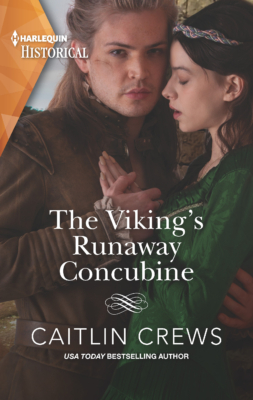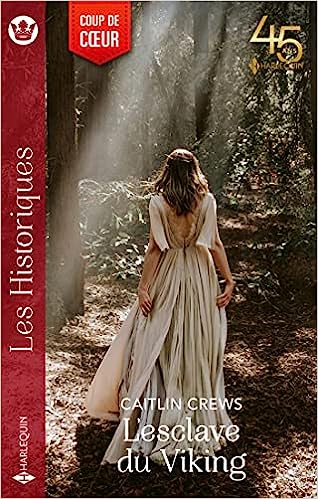The Viking’s Runaway Concubine
Book 2 in the Ragnall's Viking Warriors Series
HEAT
LEVEL:
Down & Dirty
The Viking’s captive
Bonded by more than chains…?
Renowned Viking warrior Ulfric can’t stop thinking about his runaway concubine, Eithne. Their powerful connection seared his soul…but still she’d escaped, scarring his face in the process! But now he’s found her. He intends to teach her a lesson, but the white-hot passion between them has only grown hotter, wilder. Is he the one in danger of falling captive to the emotion only Eithne rouses in him…?
- ROMANTIC THEMES: BDSM, Bad Ass Alpha, Erotic Romance, Fantasies Made Real, Girl Next Door, Good Girl/Bad Boy, Heroine On the Run, Kidnapped Heroine, Lovers Reunited!, Meddling Relatives?, Military, MMA Fighter/Martial Artist, Playboy Hero, Revenge, Special Ops Hero, Vikings?, Virgin Heroine, Warrior
Start reading
The Viking’s Runaway Concubine
Jump to Buy Links →
Jorvik, June 919 AD
The dream woke her in a rush of red heat and shame, his name on her lips like a terrible curse.
Or, worse yet, a prayer. Soft and full of flame, as her body yet shook with a need she only pretended she’d left behind her. While the sun shined, she pretended as best she could—and yet at night, the truth stalked her and these dreams woke her as they ended the way she always had, shaking apart in his hands.
Eithne knew better than to move upon waking. She knew better than to call such attention to herself. She woke too fast yet kept herself still, her eyes screwed shut, as she fought to contain the urge within her to scream, to flail, to make those noises she had always swallowed down, no matter how difficult. She told herself she meant to push the dream away. To push him away as she should have done then.
But she had learned her lessons too well. The dream still held her fast, but with every breath, she saw a little further past it. Soon enough, she remembered herself. She was no longer trapped in his furs, subject to his pagan wickedness. She had escaped him. She had changed her fate. She shared this pallet with Osthryth, the old Mercian woman who was yet her salvation.
Salvation snored this early morn, a rough music that slowly penetrated the wild red haze within Eithne. Slowly, slowly, it brought her, if not peace—for what was peace in this damaged world of might and men, pitiless and wretched from one sea to the next—then quiet within Eithne, where before there was naught but that infernal noise, that impossible ache.
Osthryth’s snores meant safety.
After some more moments passed, her blood high, she allowed herself to believe it.
Eithne opened her eyes slowly, taking in the dim outlines of this crowded dwelling on the outskirts of busy Jorvik. She could smell the smoke from the central fire and the sour rushes on the floor, for Osthryth’s kinswoman was a bitter creature who had no pride in her home, rude and cramped though it was.
Not like Eithne. Her mother had raised her to keep whatever dwelling she found herself in clean and neat. She had sung while she worked, but that life was long gone now. Her girlhood was as much a dream to her now as he was, and she would have much rather dreamed of those days than of him.
But well did Eithne know that her mother was long dead. And Dublin was across the sea from these hostile lands. She had no hope that she would see it again this life.
She told herself it mattered not. There was nothing there save misery.
The red tendrils of the dream seemed to tighten around her again then, and she did her best to push them away. She sat up, taking care to move as if her bones creaked and ached, the way Osthryth’s did. That was the first thing Osthryth had taught her when she’d encountered the old woman in the woods. Eithne had been running for days by then, hungry and terrified, certain that at any moment she would be caught and killed.
You are a fair sight too pretty to kill, I fear, the old woman had rasped when Eithne had told her what she’d done. Her gaze had been as steady as it was something like sorry. As if she knew exactly what a curse it was to have a pretty face in a world where men ravaged lands for what treasures they could find. Then took them at will. They will use you first and make you wish you’d cut your own throat.
It wasn’t that Eithne hadn’t thought of doing exactly that. She’d waited near a full year for him to trust her enough that he might leave his weapons where she could reach them. And even on that fateful night when he’d finally done it, when she’d finally picked up that dagger of his and gripped it in her hands, for a giddy, reckless moment she hadn’t known if she planned to cut him or her.
I confess I might indeed wish such a sinful thing, she had told the old woman. But there are yet men needing killing.
They’d been huddling around a fire in the lonely woods, where Osthryth had been scavenging for roots and mushrooms and other ingredients for the salves and poultices she made that she would not teach Eithne for months yet. And Eithne had half expected the old woman to condemn her then, for talking too easily of mortal sins like killing, but Osthryth had only laughed. More rueful than amused.
There always are, child, she had said. More all the time in this dark age.
The first thing she’d done was teach Eithne how to alter her appearance. How to rub her black hair with ash, until it looked as gray as Osthryth’s. What nuts to chew to make her teeth look brown and stained. How to hold herself so that she looked three times her age, and could be of no possible interest to men and their lusts. Over time, Eithne had added a hump on her back so that she looked stooped and gnarled.
It was a freedom she would never take for granted again.
In the woods, alone, she walked as she liked. Upright, her feet steady on this cold, foreign soil she’d been brought to against her will. In the woods, she drank in every bit of precious, rare light she could find in that first frigid Northumbrian winter. It was only when she and Osthryth went down into the scattered villages that she practiced her shuffle, her uneven gait.
Better to make them uneasy, not scare them outright, Osthryth had cackled after Eithne’s initial attempt at the first village they’d come to, a day’s walk from the woods where Osthryth had found her. `Tis too easy to call a healer woman a witch when the winter grows too dark.
But winter had passed. The bright spring had come, then the easy days of summer. Eithne was a good student, and by the time winter came again she had picked up the old woman’s knowledge as if she’d been thirsting for it all her life. Then, too, she liked to think she had brought her own secrets with her, gleaned in her girlhood from her grandmother, her mother. All the women she’d lost.
As if she honored them thus.
And she would always dream of crossing the cold sea once more and finding her way back to what was left of the Dublin she’d known, in those years when she’d grown up so heedless of the fate awaiting her. When she’d imagined that her people had rid themselves of the Northmen scourge forever. For she had been but little when the Irish Kings had thrown them out, and well did she recall the stories the men told of that great victory.
It was tempting to wonder what might have happened if her father had lived. If he and her mother had not succumbed to the illness that had swept through their home that terrible winter, taking not only her parents but the rest of her brothers and sisters besides, save Feargal.
In the dark of that little dwelling in Jorvik, Eithne lay on her pallet and thought of her brother Feargal, feeling all that leftover wild red within her turn into a blade, sharp and deadly.
For I will cross that sea again if I must swim it like a fish, she promised herself, as she always did. And if he yet lives, I will greet my brother as he deserves.
The purity of her hatred was cleansing. It almost felt like bathing herself the way she longed to do. She missed the clear streams in the forests, where she could immerse her whole body and let the water wash these last years away while Osthryth muttered prayers for deliverance from such pagan pursuits and kept the fire going.
But to bathe like that in a place like this would reveal her, even if she dared brave the crowded riverbanks here. It was no more available to her than a swift boat across the Irish Sea to take her back home, still clutching the dagger she’d taken when she’d escaped her captor and cut him as she went.
Eithne would have to settle for the bright, cold fire of her hatred instead.
Truly, it was her closest friend, so close did she carry it.
She sat with it there in the dark a while longer, nursing it. All around, Osthryth’s kinsfolk slept crowded in around the open hearth. There had been no meat for the stew these last nights, though privately, Eithne suspected that Osthryth’s kinswoman did not wish to waste what meat she might have on two old, worthless women. And in that, Eithne could not rightly blame her. For the poor woman had six children to feed and a man who came home with no fish, reeking of ale. These were cramped conditions and hard times, even in Jorvik, which so many villagers Eithne had met over her travels this last year had spoken of with awe.
For surely Jorvik must be a sacred place indeed, one villager had told her with great confidence, far to the north. Else why should so many fight to claim it for so long?
Eithne had nodded sagely when what she’d truly wished to do was lecture the man on river access and Northmen fleets, kings and their blood-soaked wars. But well had she learned that no man, even an aged farmer in fields far away from the sound of any battle, wished to hear a woman’s opinions. Particularly if said opinions were both correct and contrary to his own.
Never let it be said I cannot learn, she thought dryly.
Eithne crept from her pallet, drawing her ragged clothes around her as she moved. She knew the outer cloak was most important, tattered and torn as it looked, telling any who gazed upon her that she was little more than a crone. Withered and beneath notice. She picked her way across the small hut, careful not to look too nimble. Though she thought she was the only soul awake, there was no way to be sure and there was no point in risking discovery. She and Osthryth were to spend but one more day here selling their wares, offering healing and hope in equal measure to the women who sought them out, before moving on. Far away from this treacherous place and back into the safety of the dark Northumbrian woods.
Eithne made it across the crowded floor, then eased her way out the door, slipping out into the last gasp of night. As she had done every night they had been here, when the dreams tortured her awake and she could no longer bear to lie still. She closed the door behind her, then huddled against it. Even in the dark, this Jorvik was a grimy, gritty place. There were people everywhere, strange men in odd costumes speaking languages Eithne could not fathom. Men slept outside, for they had no dwellings of their own and partook too much of ale. Their snores were rougher than Osthryth’s, and yet gave her no sense of well-being. The smell of livestock and refuse rose thick in the air, and even before dawn, when it seemed only she stirred, Eithne could sense the danger here.
It was like its own smoke in the air. Like a hand at her throat. And she knew she would not truly be easy until she and Osthryth left this place today, making their slow and steady way back out into the wild forests, where there was quiet. Fewer eyes to look upon them. Woods to swallow them whole and allow them to walk and talk as they pleased, with no worry that they might be watched.
The wild forests, where he was not.
Eithne swallowed hard, for if there were a hand at her throat, she knew well it was his.
She reached her hand into the deep pockets of her cloak and felt the reassuring weight of his dagger, strapped to her hip. She kept to the shadows outside the small dwelling, not wishing to draw any attention to herself as she stood, hunched over like a crone, and let herself feel all the things she dared not show in the light of day.
It had been like this since they had arrived here. It was as if she could feel him, as surely as if she looked upon him with her own eyes again. That hard face, etched in bold lines that led straight to his mouth like stone. His dark blond hair in thick braids, his midnight gaze knowing and implacable.
She shivered, though the summer morning was not cold.
It would be better when they quit this place.
For it had been a long year since she’d cut him with his own dagger and fled. More than a year. Eithne had hoped that he might fall in battle, like so many men did, but she knew too well he had not. She would have heard of it if he had—whenever great warriors fell, the songs soon followed. Like many, she had hoped that the Lady of the Mercians, a queen in this land of too many warring kings, might turn back these Northmen at last. For they were the very same clan the Irish Kings had ejected from Dublin when Eithne was a babe.
They had retaken Dublin—and he had taken her. Over the sea and into Northumbria to fight at Corbridge, then on to Jorvik, where it was thought they might finally be beaten off for good—but the Lady had fallen last summer. Soon after, Jorvik had been claimed by Ragnall, a kinsman of Sitric, who even now ruled her beloved Dublin.
Dublin, where her brother had sold her without a second thought to gain favor and save his own skin—but she could not think of Feargal. Not where others might look upon her face and see her hatred bloom unchecked.
This was Jorvik, where Ragnall had now ruled for the whole of a long year. There was no safety here. For wherever Ragnall was, Eithne knew, so, too, was he.
And only here, in the rancid dark of the summer morning, where Eithne had the freedom she had claimed for herself by spilling his blood—the only real currency in these days of war and sorrow—she allowed herself to think his name.
Ulfric.
A mighty warrior, his name spoken in honor and sung in mead halls, though Eithne cared nothing for men’s dark deeds. Ulfric, feared wherever he stood, beloved by Ragnall, and for too long, her master.
Out here in what was left of the dark, Eithne closed her eyes tight and did not try to hide the deep shiver that rolled through her, a betraying red heat made of equal parts shame and fury that she knew anyone watching would mistake for the ravages of age.
When what it was, in truth, was an ache deep inside, a longing, that she’d come to think akin to the weakness some men had for their ale.
He had made her a drunkard. In her dreams, she still drank deep.
She would kill him for that, had she only the opportunity. With his own blade or die trying.
And she stood there as the day broke over this accursed place where the Ouse and the Foss met, as close to him she had been in over a year. As close to him she intended to be for the remainder of her life. Or his, which she hoped would be brutally short, for there were even now whispers of Edward of Wessex, who had already claimed Mercia. There were always worries about the bloodthirsty Danes and the brutal Scots. They would rise, as they always did, one after the next. Men claimed they wanted only land, but little did they tend to what they had whenever there were blades to swing or songs to sing of brave deeds in battle.
Ulfric would serve his King forever. And Ragnall had set up his court here in Jorvik, for with her own eyes she had seen his coin in the marketplace and heard tales of him and his men. It was risky to be here, that was certain, though it were unlikely that any Northmen would seek out the services of two old crones and the salves and ointments they peddled to the women who had need of them.
Ulfric would serve his King, and kings had a tendency to die horribly, and maybe someday these lands would be free of them both. Maybe then these dreams would leave Eithne in peace, and she would think no more of that year she had served him.
That year he had taken her body and bruised her soul, making her little more than a wicked flame who danced at his bidding.
She felt the dagger in her hand, and no, she would not forgive that, either.
Eithne knew he slept here, somewhere in this dirty gathering place of too many people, too many grim-eyed warriors and fishermen, slavers and tradesmen from afar. She knew he slept here and she hoped only that he woke remembering his own steel at his throat, the murder in her green eyes, and was uneasy.
Every morn had she wished thus, and tomorrow she and Osthryth would be gone.
She intended to think of him no more.
* * *
Trade was brisk that day.
For word had got about that the old, wizened healer women were leaving, so those who had taken their time in coming to them tarried no longer. Osthryth counseled two heavily pregnant women on how best to prepare for their coming births. Eithne quietly prepared a selection of herbs for a young girl who came with her mother, speaking brightly of her coming wedding.
“So much does her husband desire her that he is half-mad with it,” said the girl’s mother, and though her laugh was merry on the breeze, her eyes were cool on Eithne’s. “It would be a pity if he were to think others had been where he has decreed only he may go, would it not?” She laughed again, and her gaze turned to her daughter. “These men and their conquests, forever in search of untouched lands. They will be the death of us all.”
“It is ever so,” Eithne agreed. She handed the bundle of herbs to the girl. “But there is nothing to fear. When he claims you, you need only tuck this where you bleed each moon and he will imagine only he has ever done so.”
The girl’s eyes were wide and hopeful, telling Eithne more than she needed to know about the future that awaited her. A man’s temper, a man’s fists. A man who strutted about believing himself king of his own dwelling, at the least, while his woman must forever bend and twine herself around him, his happiness her own health.
If there were men in these cursed lands who did not behave thus, Eithne had never heard tell of them.
“Thank you,” the girl’s mother said quietly, pressing a coin into Eithne’s hand—a far greater payment than she would have requested. “It is best to begin a marriage with all the advantages, I think. For time and the gods will do as they will, no matter what.”
Eithne did not blaspheme aloud in public, though she found herself wondering which was the worst. Time and the gods, as the woman said?
Or these men who battered the world into their image, so concerned with glory that they left naught but ruin behind?
She was happy, after the woman and the girl left her, to pack up their remaining wares. She was already breathing easier at the prospect of leaving this eve, walking until dark. She did not like these crowded places. She could not. Too well did she remember how it had been in Dublin after the Northmen came. The crowds of people thrown from their homes. The dead. The pyres. The misery.
The slave auction.
She felt something cold skate its way down her back, and found herself glancing around, as if deadly eyes were upon her. But she saw only the sprawl of Jorvik.
It was likely no more than memories. Yet another reason to put this place behind her.
Last summer they had not come here, fearing unrest in the wake of the Lady of Mercia’s death. But there had been no question but to come this summer. The more they sold, the better the winter. That was the way of it. And there were always more sales to be had in a place with more people. Still, as practical as she knew it was to come to this grimy city, Eithne thought it would take some time to get the stain of it off her.
As if she would need, once more, to shift his weight from her body. As if he still sprawled there, all of that heat and muscle, battle-ready and bold, pressing her down into his furs—
Eithne blew out a ragged breath as she walked, headed back to Osthryth’s kinswoman’s hut, slipping between the dwellings crowded in together as she went. They would collect their few possessions, bid their farewells.
She was thinking how good it would feel to put Jorvik at her back at last—
And in the next moment, everything was spinning.
Then she was slammed up, hard, against the nearest wooden wall.
Her hands rose in a fake surrender, for well did she know that a bit of cringing went a long way. For it was ever thus that predators were drawn to weakness. It was why she hid the better part of the coin she’d made on her person, but kept a more accessible purse with only a few bits at the ready.
But when she lifted her gaze, she froze.
Her nightmare reared before her, only this was no red dream.
He was here.
She could feel the fury come off him in waves. As if it was smoke and flame. As if he was.
One hand braced against the wall beside her, his other hand fast at her throat. Not choking her. She only wished he would choke her, for then it would be over.
Instead, he merely held her in that way he had held her so many times before.
He stood above her, blocking out the sun, his shoulders wider than she recalled. His cloak finer. His face drawn crueler—with the scar she’d left him across one cheek.
And to her horror she felt a little curl of wicked sensation wind around and around within her, shaming her anew.
“Eithne, my little slave,” Ulfric growled at her, his dark eyes afire. “You have made yet another terrible mistake.”
End of excerpt
Rebel Heart Books is my absolute favorite bookshop. I'd love it if you'd support this woman-owned, delightful place where you can also get signed copies. See if this book is available through them. Thanks!

The Viking’s Runaway Concubine
is available in the following formats:




 Book 1
Book 1 Book 2
Book 2









